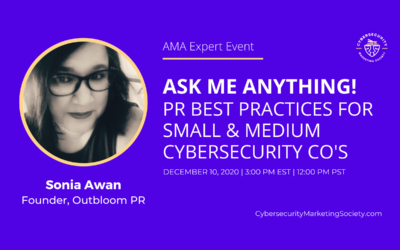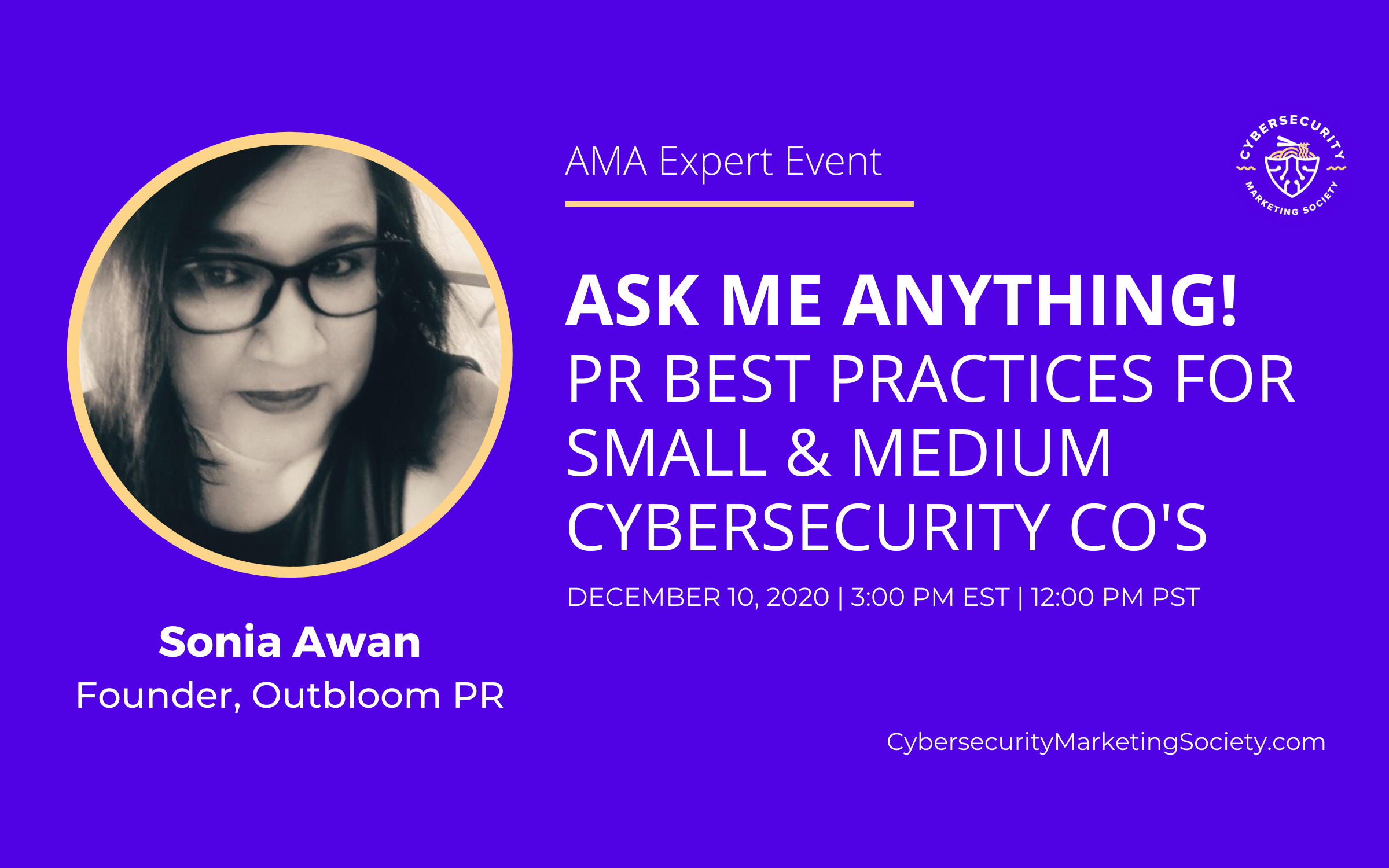PR Best Practices for Small & Medium Cybersecurity Companies



For small and medium cybersecurity companies with limited resources, sometimes a PR firm on retainer doesn’t make sense. Instead, there are other ways to handle your PR needs. On December 10, Cybersecurity Marketing Society co-founder Gianna Whitver sat down with PR guru Sonia Awan, founder of Outbloom PR, in an ‘Ask Me Anything’ session to uncover the best approaches in PR for small- and medium-sized cybersecurity companies!
Read our recap below and check out the full video at the bottom of this post!
What Does Public Relations Actually Do?
Awan noted that public relations isn’t very clear to those in the space. Many companies are hesitant about adding PR to their campaigns if they already have marketing and advertising activities. She realized that “a lot of people don’t understand what PR actually is.” Although PR metrics and results are difficult to quantify, having high-quality media mentions from reputable outlets can make a huge difference. If your company lands a mention in trade publications, CEOs and CTOs are reading these outlets.
Internal Resources Cybersecurity Companies Need for Good PR
PR can build trust and reputation in the industry and community. In order to do that, cybersecurity companies need internal alignment and resources to support their PR consultant or firm.
Have a Good Writer Available and Don’t Be Press-Shy!
Specifically, companies can provide their expertise on subjects to the media, and to do this, they need to be able to respond quickly to queries on topics. When you have a strong writer on the internal team to produce content, you can meet that need of reporters searching for expertise and professional opinions at a rapid pace, which puts you at an advantage for getting a media mention. Additionally, and especially as a smaller company, your press-facing people, your team, and your brand needs to be comfortable with expressing views and making your presence known in order to participate in the conversation.
Reply Quickly…or Don’t Bother!
However, in many instances, because companies don’t understand how PR works, they risk falling out of favor with outlets. For example, Awan discussed how companies lose credibility if she connects their spokespeople to outlets, but they don’t respond to requests. PR is all about relationship building, and those connections need to be cultivated and your company needs to be consistent.
Make Sure Your Reply Answers the Question…without Pitching the Product!
When companies do offer their answers to questions, their responses sometimes aren’t clear and aren’t what the reporters are looking for. It’s really important to read what the actual questions are and discover what the reporter really wants to know. Awan encouraged professionals to do your research before responding back so it’s a quality response. The response always has to be vendor neutral and product neutral.
Practice Makes Perfect for Media Interviews
In addition, reporters are seeking to talk to subject-matter experts, not marketing professionals. These experts are often new to these situations. Many employees don’t know how to approach speaking to reporters to articulate their point of view. Awan recommended that companies partake in media training. By setting up mini Q&A sessions that emulate what questions reporters would be asking, it helps employees practice their talking points (which are provided by a good writer) and get comfortable with the process.
How to Build Relationships With Reporters
Awan’s job centers around strengthening her relationships with journalists. With these solid connections, she has a consistent influx of reporters looking to be connected with her clients for expert opinions and content for stories. However, many small or medium companies don’t have a PR consultant or agency at hand, so they reach out to journalists on their own to provide expert opinions.
Being a Publicist is Like Being an SDR…There’s a Lot of List-Building & Follow Up!
Awan urged professionals to first do their research and build a list of potential outlets and journalists to reach out to. The list should include specifically reporters that are writing about your company’s specialty or product offerings. Typically, when she reaches out to journalists, she introduces herself first to make the connection and asks them if they’d be interested in discussing her new client.
Just like an SDR, you will always need to follow up, as reporters are inundated with inbound requests (part of the reason relationship-building is so important…to stand out!).
If You’re Marketing, You’ll Get Sent to the Publication Sales Team
It’s also important to keep in mind that many reporters won’t respond to marketers because they want to speak to someone directly involved in the subject matter, so it may be necessary to think of a different person than you (sorry!) to send the pitch.
What Do I Pitch About?
However, you can’t just pitch anything. Make your pitches interesting enough that even if reporters didn’t know about the topic, now they’re thinking about it from a new perspective.
With the endless cybersecurity news and clutter online, you need to stand out when reaching out by being creative and finding a story. The first step is determining who the best spokesperson is and seeing if there’s a story. With a story, you’ll be able to send reporters content they’ll actually want to read.
Furthermore, Awan said, “Always tie it in with what’s happening in the news cycle, even if it’s something small.” By finding a story that’s relatable and timely and writing a pitch around it, you’ll create an opening for your spokesperson to comment on the issue.
Build Your Spokespeople as Thought Leaders
Thought leadership is always necessary to boost your spokesperson’s credibility as an expert source, and even press releases about company news like new hires, announcements, etc. will help your company stay relevant and get your name out there. Bylines (such as in Dark Reading) are also important in establishing a media presence.
Even if Your Product is Global, Don’t Forget About Local Press!
Community building is another topic that’s important to a cybersecurity company’s reputation but often isn’t prioritized. By focusing on how your company is doing good for the local community, reporters will be interested in the impact. Even if it’s something small like a toy drive, local reporters want to write about local businesses doing good locally. By coming up with these small but important events, companies will build their reputation.
Build Your Reputation
In addition, starting local helps get you press and build your brand. You can’t just pitch anyone—having national outlets like The Wall Street Journal on your list isn’t a realistic goals for your first press mention.
Awan describes climbing the press reputation ladder this way: “Go get the low-hanging fruits to move to the top of the food chain.” Think about local outlets because you will be amplified as a local expert.
PR Takes Time to Ramp Up
Especially if your company is doing its own PR, it will take time. A lot of time is spent on research to determine what reporters to target, their contact information, and who the reporters’ audiences are, especially when you don’t have access to media databases. As a result, the timeline depends on how fast you do your research and what your message is. Awan stressed that “PR is all about messaging. You have to find the right message so it gets to the right people, that’s how the right people get interested.”
It can take months to build initial relationships with reporters. It doesn’t happen right away. Don’t expect anything in return right away when you reach out. The process demands a lot of follow ups to get a response and keep the relationship going. Awan recommends three different follow ups to try to get a response, but the timing always depends on messaging and what the reporter is looking for. You need to balance making yourself relevant with not being annoying. Always be polite and expect rejection. However, keep those relationships intact even if there’s nothing happening at the moment because you never know what could happen in the future.
Awards are for Sales Credibility, Not Spokesperson Thought Leadership & Reporters
Many cybersecurity marketers wonder if it’s worth the time and money to submit their companies for awards…and from a press perspective, the answer is: no. However, rewards are great for salespeople to use for credibility. When sharing thought leadership or pitching to reporters, awards don’t matter as much as the content of the pitch.
You Don’t Need a Big PR Retainer…Start Small
Not all companies immediately need a PR agency or PR consultant. However, there are initial steps your company can take before making a substantial investment. First try out press releases, announcements, and thought leadership pieces, and assess what press interest is in the media you’ve generated. When your company wants to tap into bigger events and sponsorships, then start thinking about getting a PR agency on retainer and if your company will have enough content to make it a worthwhile investment.
If you decide to take on a PR agency but need to make the case to your company, research what your competitors are doing in the space and what outlets are covering them. Awans said, “If you want to have that same level of media coverage or prominence in the news, you need to invest.” That third-party validation can be crucial for a company’s reputation.
Start with a PR Consultant
However, your company can also hire a PR consultant if you have a message, product, or announcement to share with the world and want advice. When searching for the consultant, look for someone with a solid portfolio of experience that goes beyond just press releases to ensure they’re established in the industry. In addition, keep your expectations realistic. PR takes time to establish the groundwork to getting your company and spokesperson media-friendly and also requires the internal investment of a solid writer.
You need to have a good connection with your PR consultant because they’ll be doing more than media relations, like crisis communications, in the case of negative press. For cybersecurity marketers and cybersecurity companies in particular, this can take the form of a press strategy to respond to a breach. In the case of a bad event, your company needs to be transparent and have a contingency plan in place. By being open and communicative, you will continue maintaining relationships with the media.
To learn more about building a public relations strategy for your small- or medium-sized company, watch the recap here or below. Follow the Cybersecurity Marketing Society on LinkedIn and Twitter to join more events like this in the future.

.png)
.png)
.png)